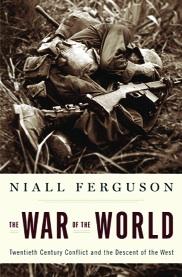The War of the World: History’s Age of Hatred
Published in 20th-century / Contemporary History, Book Reviews, Issue 6 (Nov/Dec 2006), Reviews, Volume 14 The War of the World: History’s Age of Hatred
The War of the World: History’s Age of Hatred
Niall Ferguson
(Allen Lane, £25)
ISBN 9780713997088This book is a tremendous read, thoroughly researched and presented in a style easily followed. Despite often sickening subject-matter, the author holds the reader’s attention. Yet the text raises serious questions that it never answers. It gives facts that do not total its conclusions. Its style’s apparent clarity obscures this, as in its handling of one of its sub-themes. Niall Ferguson declares that even by 1945 the western (Euro-American) powers had lost the dominant world position that they had enjoyed in 1900: that the USA itself was ‘much less powerful than the European empires had been forty-five years before’. He does not make it clear whether he means that the USA was less strong than all the 1900 European empires together (probably true) or than any one of them (palpably untrue). Moreover, his case for his statement is that American hegemony was disputed by Stalin’s Union of Soviet Socialist Republics (‘the main beneficiary of victory in Asia, as in Europe’), the same Russia that he placed among the European empires in 1900. Certainly, the subsequent history of the century makes a better case for the decline of the old imperial metropoles, but most of that period, from 1953 onward, is thrust into an epilogue containing 51 pages out of nearly 700.
The same is true of the main theme. Ferguson declares ‘ethnic divisions actually more important than the supposed struggle between bourgeoisie and proletariat’ (reviewer’s italics). Accordingly, he depicts the twentieth century in terms of violence between ethnic groups caused by ‘ethnic conflict, economic volatility and empires in decline’. Again his formulation becomes less acceptable in the light of the facts he presents. Of his causes, only ethnic conflict is examined in detail, although it is least disputable; ethnic violence has to be produced by ethnic conflict. Economic volatility is examined particularly abruptly. In his introduction the author distinguishes it from simple stagnation or decline; ‘social stagnation may . . . follow from periods of economic growth since the benefits of growth are very seldom evenly distributed’. He does not demonstrate this thoroughly. Certainly such phenomena as European anti-semitism (mentioned at length) and, more locally, religious strife in Belfast (unmentioned save in the epilogue) developed from expanding economies, but recent atrocities like Rwanda and Darfur would scarcely seem to fit the analysis. For Rwanda, Ferguson dismisses the idea of land hunger as the cause: ‘to believe that Rwandans killed each other for the sake of a few extra acres of farmland is like believing that the Germans invaded the Soviet Union because they, too, were chronically short of living space’, states one who has shown that the leaders of the said invasion did believe that the Germans suffered from such a shortage. Moreover, he ignores the fact that many people in authority see benefit in ethnic stress, particularly as an alternative to ‘the supposed struggle between bourgeoisie and proletariat’. He insists that Tsarism did not encourage actual pogroms, but his facts show that it maintained and reinforced the conditions for such actions, as did Belfast’s major Protestant industrialists in their context. Not surprisingly, ‘empires in decline’ are neglected too, and in the same way. In practice, the seeds of ethnic trouble that sprout when an empire is in decline were planted by that empire when it was ascending, as in the scramble for Africa, before the book’s period, and the similar scramble for Turkey’s Arab provinces in 1918. The book itself shows that while the worst of the Holocaust occurred when Nazi Germany faced defeat, it had begun when it was victorious. It is true, too, that, save in exceptional cases (India in 1947), ethnic conflict is often fomented in declining empires by rival, more powerful ones. All empires are evil empires.
Ignoring such facts weakens Ferguson’s overall thesis as well as its parts. Seeing ethnic strife as essentially spontaneous (save in Nazi Germany), he sees the ruling élites (particularly the traditional ones) as they see themselves. This has the advantage of enabling him to take a disenchanted view of the opposing parties in both the world wars. Even here, however, it allows him to accept the idea that Britain joined the first struggle to liberate Belgium, whereas had it not joined it would have destroyed ten years of alliances aimed at ending its so-called ‘splendid isolation’. More importantly, Ferguson assumes rather than proves the primary role of ethnic as against class conflict. He describes Russia’s 1905 revolution as ‘ethnic polarisation’, and gives space that he could have allotted to the aims and divisions of the 1917 revolutionaries to quoting anti-semitic utterances of some individual Bolshevik supporters. Though Stalin gets a maximum amount of salutary space, other socialists are ignored or marginalised.
Yet these socialists’ failure should not just be assumed to be a result of the natural and inevitable predominance of the ethnic factor. Their vision of a more rational future deserves investigation, even in the limited context presented by this book. Ferguson does not bother to consider their errors, either the Austro-Marxists’ adaptation to their empire’s expansionism, Irish Labour’s inability to lead their country’s independence struggle, the German labour movement’s refusal to unite to stop Nazism or French socialist support for war against Algeria. Perhaps all these fiascos were the natural result of the utopian nature of socialism, but Ferguson does not bother to argue this. On the facts he gives, this silence is unacceptable. For Ferguson, nation states must accept the authority, direct or indirect, of empires, benevolent or malign. Today the north Atlantic (Judaeo-Christian) peoples must stand together against the malign imperialism of Islam. He may be correct; he has still to prove his case.
D. R. O’Connor Lysaght is a writer and historian.
















